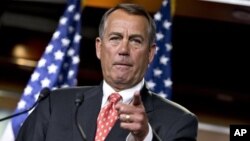Negotiators for U.S. President Barack Obama met with key congressional leaders about the country's looming deadline to resolve significant government financial issues, but there was no immediate breakthrough in the contentious stalemate.
Treasury Secretary Timothy Geithner talked with Speaker John Boehner, the leader of the Republican-controlled House of Representatives, about the mandated $600 billion in spending cuts and tax increases set to take effect January 1, 2013.
Boehner also talked with the president late Wednesday about how to avoid having the country cascade over what Washington is calling a "fiscal cliff." Boehner reported little progress, however, in reaching a compromise.
"No substantive progress has been made in the talks between the White House and the House over the last two weeks," he said.
Watch a related report from VOA's On Assignment
Boehner rebuked Obama for staging gatherings of taxpayers this week who support his call for eliminating tax cuts for the wealthiest Americans, those earning $250,000 and more a year.
"Listen, this is not a game. Jobs are on the line, the American economy is on the line, and this is a moment for adult leadership," said Boehner. "Campaign-style rallies with one-sided leaks to the press is not the way to get things done here in Washington."
The forced spending cuts would affect important defense and domestic programs, while the question on the tax cuts is whether they should be extended beyond their scheduled December 31 expiration.
The Senate Democratic leader, Harry Reid, said, "We are still waiting for a serious offer from Republicans."
Obama, a Democrat newly re-elected, is seeking to end the tax break for the wealthiest Americans. But his Republican opponents say ending that tax cut would curtail creation of more jobs.
Wednesday, Obama urged the Republican-controlled House to quickly approve a Senate-passed measure that would extend the tax cut for those making less than $250,000 annually. He said the White House and lawmakers could then deal with other aspects of the dispute over government spending and taxation.
"And since we all theoretically agree on that, we should go ahead and get that done. If we get that done, a lot of the other stuff is going to be a lot easier."
Treasury Secretary Timothy Geithner talked with Speaker John Boehner, the leader of the Republican-controlled House of Representatives, about the mandated $600 billion in spending cuts and tax increases set to take effect January 1, 2013.
Boehner also talked with the president late Wednesday about how to avoid having the country cascade over what Washington is calling a "fiscal cliff." Boehner reported little progress, however, in reaching a compromise.
"No substantive progress has been made in the talks between the White House and the House over the last two weeks," he said.
Watch a related report from VOA's On Assignment
Boehner rebuked Obama for staging gatherings of taxpayers this week who support his call for eliminating tax cuts for the wealthiest Americans, those earning $250,000 and more a year.
"Listen, this is not a game. Jobs are on the line, the American economy is on the line, and this is a moment for adult leadership," said Boehner. "Campaign-style rallies with one-sided leaks to the press is not the way to get things done here in Washington."
The forced spending cuts would affect important defense and domestic programs, while the question on the tax cuts is whether they should be extended beyond their scheduled December 31 expiration.
The Senate Democratic leader, Harry Reid, said, "We are still waiting for a serious offer from Republicans."
Obama, a Democrat newly re-elected, is seeking to end the tax break for the wealthiest Americans. But his Republican opponents say ending that tax cut would curtail creation of more jobs.
Wednesday, Obama urged the Republican-controlled House to quickly approve a Senate-passed measure that would extend the tax cut for those making less than $250,000 annually. He said the White House and lawmakers could then deal with other aspects of the dispute over government spending and taxation.
"And since we all theoretically agree on that, we should go ahead and get that done. If we get that done, a lot of the other stuff is going to be a lot easier."
